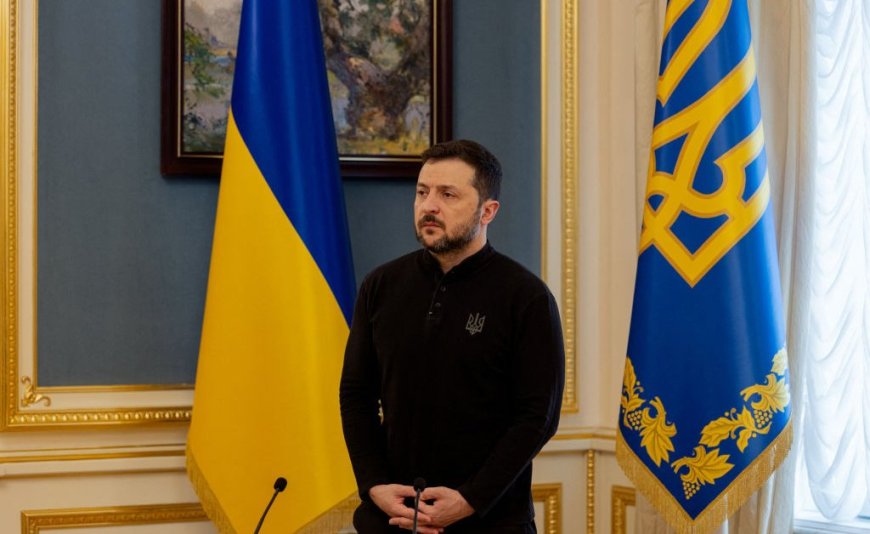Ukrainians Rally Around Zelensky as Trump and Putin Denigrate Him
After Trump called Zelensky a “dictator” and began talks with Russia, even some of Zelensky’s harshest domestic critics have begun defending him.


KYIV, Ukraine — Days before the third anniversary of Russia’s full-scale invasion, Ukrainians are as somber and tense as they were right before Moscow launched the war. Only now, they aren’t just worried about their longtime enemy.
Ukraine’s stunning new threat comes from its once staunchest ally, the United States, whose support appears to be fading as President Donald Trump parrots the propaganda of Russian President Vladimir Putin while pledging to stop the fighting between the two countries. [time-brightcove not-tgx=”true”]
After their initial shock at Trump’s false claims this week that Ukraine is led by a “dictator” who started the war with Russia, the Ukrainian people are rallying around a defiant President Volodymyr Zelensky, who publicly criticized Trump for promoting Russian “disinformation.”
“Yes, he’s not a perfect president, but he’s not a dictator,” said Kateryna Karaush, a 25-year-old tech worker from Kyiv who like many Ukrainians—and even some Republicans in Congress—is struggling to wrap her head around Trump’s embrace of Russia, which represents a major about-face in U.S. foreign policy.
“It feels like the whole world is against us,” Karaush said.
Against long odds, Ukrainians—with massive military support from the U.S.—have prevented Russia from overtaking their country, even if roughly one fifth of it is now under Russia control.
But after three years of war, both civilians and soldiers are exhausted. Hundreds of thousands have been killed or wounded, tens of thousands are missing, and millions have fled the country.
The mood only became gloomier in recent days as Trump signaled his desire to rapidly bring the fighting to a close on terms that Zelensky and many in the West say are too favorable to Russia.
After Trump called Zelensky a “dictator”—for legally postponing an election last year—and as reports emerged of U.S. and Russian officials meeting in Saudi Arabia to discuss a possible ceasefire without input from Ukraine, even some of Zelensky’s harshest domestic critics have begun defending him.
“We may have different opinions about Zelensky, but only Ukrainian citizens have the right to judge his support,” said Yaroslav Zhelezniak, a lawmaker from the opposition party Holos. “And to publicly criticize him too, because, in the end, he is our elected leader.”
Trump’s harsh words for Zelensky have drawn criticism from Democrats and even some Republicans in the U.S. Congress, where defending Ukraine from Russia—with tens of billions of dollars in military aid—has had bipartisan support. But Vice President J.D. Vance admonished Zelensky for publicly warning Trump about falling for Russian disinformation.
On Thursday, the deepening tensions led to the cancelation of a news conference that had been planned to follow talks between Zelensky and Trump’s Ukraine envoy over how to end the war.
A poll released Wednesday by the Kyiv International Institute of Sociology put public trust in Zelensky at 57%. The survey was conducted Feb. 4 to Feb. 9 among 1,000 people living across Ukraine in regions and territories controlled by the Ukrainian government.
“We have a president whom we support. During war, we are united,” said Larysa, a 52-year-old resident from the northeastern city of Kharkiv, who refused to give her last name due to security concerns.
: Poll Shows Dip in Trump’s Approval
The political rift with the U.S. comes as Ukrainian forces, outnumbered and outgunned, increasingly struggle to hold back Russia’s slow but steady advances.
Speaking from the front lines, some Ukrainian soldiers said they were not panicking yet, and not ready to give up the fight.
“Even if we don’t get enough weapons or if funding is cut, that doesn’t change our duty to (fight),” said a Ukrainian officer who spoke on condition of anonymity in line with military rules. “No shells? We’ll take up rifles. No rifles? We’ll grab shovels.”
On Wednesday, Trump echoed one of Putin’s frequent talking points, claiming Zelensky, whose term expired last year, must hold elections. But the idea has little traction within Ukraine—even among opposition politicians, who recognize Zelensky’s right to postpone elections during wartime.
“Elections are not needed right now because they should only take place when we understand the framework of (a peace) agreement with Russia,” said Volodymyr Ariev, a lawmaker from the opposition European Solidarity party. “Holding elections now would only benefit the Kremlin, further dividing Ukrainians and installing a new president who could sign a deal favorable to Moscow.”
An adviser to Zelensky, Mykhailo Podolyak, gave an additional reason for holding off any election until there is peace: Russia might seek to interfere in an electoral process that would already face significant challenges.
Millions of displaced Ukrainians living abroad would struggle to participate—not to mention the hundreds of thousands Ukrainians living in Russian-occupied territories, whose ability to vote would be virtually impossible.
Around 800,000 Ukrainians are currently serving in the armed forces, making it difficult for them to cast ballots without weakening the military. And those fighting would be unable to run for office—a right guaranteed under Ukrainian law.
“Holding elections before a peace agreement with security guarantees is signed would be devastating for Ukraine,” said Valerii Pekar, a professor at Kyiv-Mohyla Business School. “The U.S. and Russia are now united in promoting the idea of ‘elections first, then peace’—which is the quickest and cheapest way to bring Ukraine down.”
—Associated Press journalist Volodymyr Yurchuk contributed from Kyiv, Ukraine.


























































